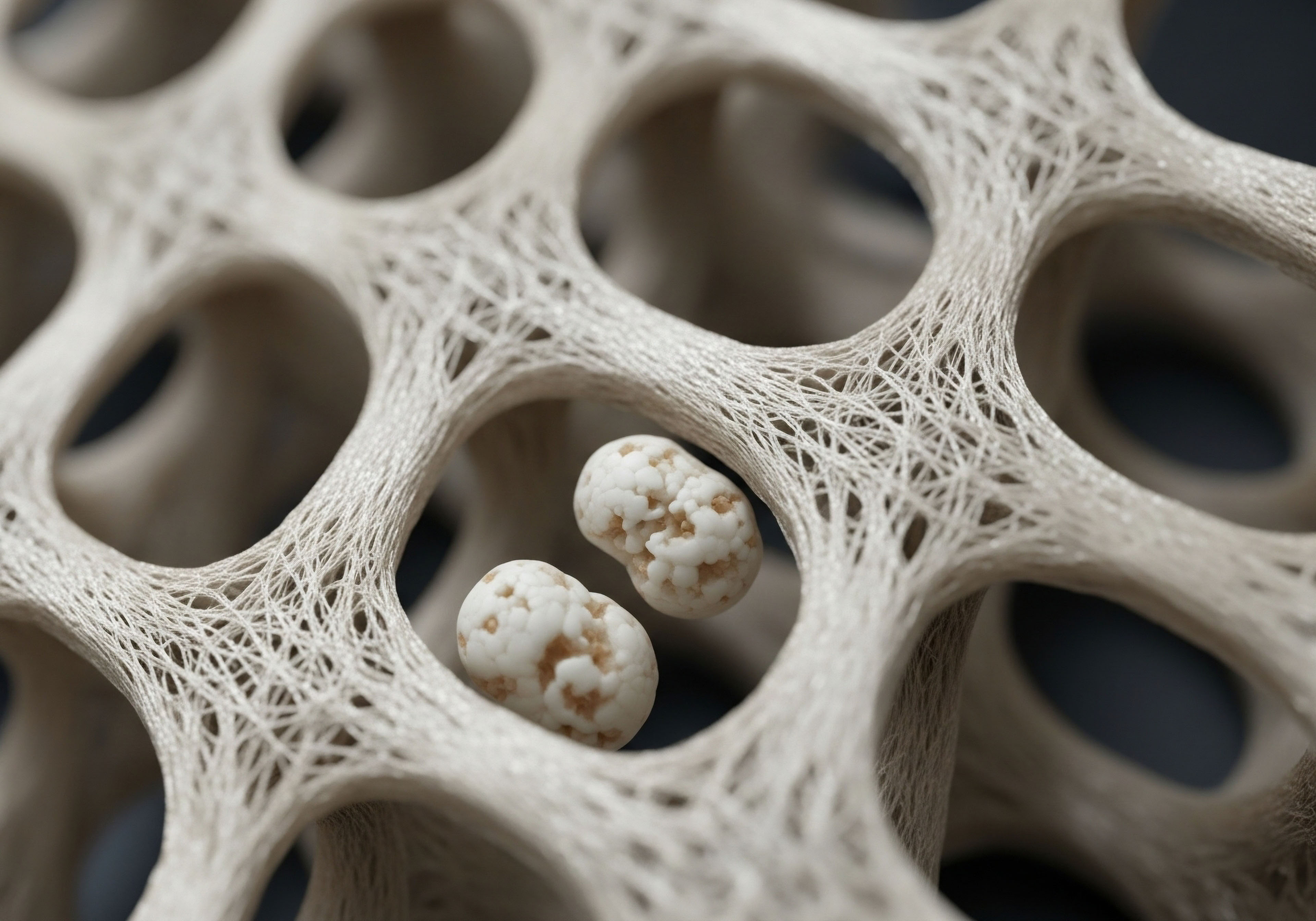

Fundamentals
The subtle shifts in your vitality, the persistent fatigue, or the recalcitrant weight gain ∞ these are not merely markers of time’s passage. They represent a complex dialogue within your biological systems, a conversation often shaped by the intricate interplay of hormonal balance and metabolic function.
When individuals embark on hormonal optimization protocols, such as testosterone replacement therapy or other endocrine system support, they initiate a profound biochemical recalibration designed to restore a sense of equilibrium and vigor. This therapeutic intervention, while powerful, does not operate in a vacuum. Its long-term efficacy and the overall trajectory of well-being are inextricably linked to the foundational lifestyle choices one consistently makes.
Understanding your body’s energetic currency and its intricate messaging system becomes paramount. Hormones, these molecular messengers, orchestrate nearly every physiological process, from energy production and utilization to mood regulation and tissue repair. Metabolic function, in turn, dictates how efficiently your cells convert nutrients into usable energy and manage waste products.
When lifestyle factors, such as dietary patterns, physical activity, sleep architecture, and stress management, remain unaddressed during periods of hormonal therapy, they introduce discordant notes into this delicate orchestration. This can significantly alter the intended benefits of endocrine support, leading to unforeseen metabolic consequences that can undermine the very essence of renewed vitality.
Your body’s energetic and hormonal systems are in constant, intricate communication, profoundly influenced by daily lifestyle choices.
The endocrine system, a sophisticated network of glands, produces and releases these signaling molecules, influencing metabolism across all tissues. The Hypothalamic-Pituitary-Gonadal (HPG) axis, for instance, serves as a central command center, regulating the production of sex hormones like testosterone and estrogen. These hormones directly impact glucose metabolism, lipid profiles, and body composition.
A foundational understanding of these interconnections reveals that merely supplying exogenous hormones without optimizing the cellular environment for their reception and utilization is akin to upgrading a car’s engine without maintaining its fuel system or tires.

How Hormonal Therapy Interacts with Daily Habits?
Hormonal therapy aims to re-establish physiological hormone levels, mitigating symptoms associated with deficiency. Yet, the body’s response to this intervention is not solely determined by the administered dose. It is profoundly shaped by the metabolic milieu, which itself is a direct consequence of daily habits.
For instance, a diet rich in processed carbohydrates and unhealthy fats can induce chronic low-grade inflammation and insulin resistance, even while hormone levels are being optimized. This metabolic dysregulation can blunt the anabolic effects of testosterone or exacerbate the cardiometabolic risks associated with certain hormonal shifts.

The Energetic Imperative of Cellular Health
Every cell within your body demands a steady supply of energy to perform its functions. Mitochondria, often termed the “powerhouses” of the cell, generate adenosine triphosphate (ATP), the universal energy currency. Hormones influence mitochondrial biogenesis and function, thereby impacting overall cellular energy production.
Unfavorable lifestyle factors, such as persistent caloric surplus or a sedentary existence, can lead to mitochondrial dysfunction, characterized by reduced ATP production and increased oxidative stress. This compromises the cellular environment, diminishing the effectiveness of hormonal therapies and setting the stage for long-term metabolic complications.


Intermediate
For individuals already familiar with the foundational principles of hormonal balance, a deeper exploration reveals how unaddressed lifestyle factors during hormonal therapy can subtly, yet significantly, redirect metabolic pathways, often away from optimal function. The promise of endocrine system support, whether through testosterone replacement therapy (TRT) for men, or targeted hormonal optimization for women, hinges on a responsive metabolic landscape. When this landscape is compromised by persistent suboptimal habits, the body’s intricate biochemical recalibrations face considerable headwinds.
Consider the sophisticated communication system within the body, where hormones act as vital signals. Lifestyle factors can distort these signals, leading to cellular resistance or altered receptor sensitivity. This creates a scenario where the exogenous hormones, despite being present at physiological levels, cannot fully exert their intended effects. The consequence extends beyond mere symptom persistence; it initiates a cascade of metabolic adaptations that can lead to chronic health challenges.

Unraveling Metabolic Pathway Disruptions
Unaddressed lifestyle factors exert their influence through several interconnected metabolic pathways. A primary concern involves insulin sensitivity. A diet consistently high in refined sugars and saturated fats, coupled with insufficient physical activity, predisposes individuals to insulin resistance. This condition, where cells become less responsive to insulin’s signal to absorb glucose, forces the pancreas to produce more insulin, leading to hyperinsulinemia.
During hormonal therapy, this can paradoxically counteract the metabolic benefits often associated with optimized hormone levels, such as improved body composition and glucose regulation.
Insulin resistance, driven by lifestyle choices, significantly compromises the metabolic benefits of hormonal therapy.
Another critical area involves lipid metabolism. Dyslipidemia, characterized by unfavorable cholesterol and triglyceride profiles, frequently accompanies poor dietary habits and physical inactivity. While hormonal therapies, particularly testosterone replacement, can positively influence lipid parameters, these benefits can be attenuated or even reversed if lifestyle factors remain unaddressed. Elevated triglycerides and low high-density lipoprotein (HDL) cholesterol levels contribute to increased cardiovascular risk, irrespective of optimized hormone levels.

The Inflammatory Cascade and Hormonal Efficacy
Chronic low-grade inflammation represents a silent saboteur of metabolic health. Lifestyle factors such as visceral adiposity, inadequate sleep, and persistent psychological stress perpetuate this inflammatory state. Adipose tissue, especially visceral fat, acts as an active endocrine organ, secreting pro-inflammatory cytokines like TNF-alpha and IL-6.
These inflammatory mediators interfere with insulin signaling, disrupt endothelial function, and can even alter hormone receptor expression and activity. Consequently, the efficacy of hormonal therapy may diminish, as the cellular environment becomes less receptive to the therapeutic agents.
A structured approach to integrating lifestyle modifications with hormonal therapy is essential for maximizing long-term outcomes.
- Dietary Optimization ∞ Emphasizing whole, unprocessed foods, healthy fats, and adequate protein supports insulin sensitivity and reduces systemic inflammation.
- Regular Physical Activity ∞ Incorporating both resistance training and cardiovascular exercise improves body composition, enhances mitochondrial function, and increases insulin sensitivity.
- Sleep Hygiene ∞ Prioritizing 7-9 hours of quality sleep nightly optimizes circadian rhythms, reduces cortisol levels, and supports metabolic repair processes.
- Stress Management ∞ Implementing techniques such as mindfulness, meditation, or spending time in nature can mitigate the detrimental effects of chronic stress on hormonal and metabolic health.
| Lifestyle Factor | Potential Metabolic Consequence (Unaddressed) | Impact on Hormonal Therapy Efficacy |
|---|---|---|
| Dietary Choices | Insulin Resistance, Dyslipidemia, Chronic Inflammation | Reduced hormone receptor sensitivity, diminished anabolic response |
| Physical Inactivity | Visceral Adiposity, Muscle Atrophy, Impaired Glucose Uptake | Lowered metabolic rate, reduced nutrient partitioning benefits |
| Sleep Disruption | Elevated Cortisol, Impaired Glucose Tolerance, Increased Hunger Hormones | Disrupted HPG axis feedback, reduced restorative processes |
| Chronic Stress | Adrenal Dysfunction, Increased Glucocorticoids, Insulin Resistance | Suppression of sex hormone production, heightened inflammatory state |


Academic
For the discerning individual seeking a truly comprehensive understanding, the long-term metabolic consequences of unaddressed lifestyle factors during hormonal therapy extend into the very fabric of cellular biology, influencing mitochondrial integrity, epigenetic programming, and the intricate dance of nutrient sensing pathways. This is where the profound implications of systemic resilience become most apparent.
Endocrine optimization protocols, while therapeutically robust, represent a powerful exogenous signal. The ultimate physiological response to this signal is not merely a matter of receptor binding; it is deeply modulated by the endogenous cellular environment, an environment sculpted by daily choices.
We must move beyond a simplistic view of hormone replacement as a singular solution, instead recognizing it as a catalyst within a complex, adaptive biological system. When lifestyle factors ∞ dietary composition, physical activity, sleep quality, and stress resilience ∞ remain suboptimal, they can introduce a pervasive “metabolic friction” that significantly diminishes the potential of hormonal therapies and, indeed, can accelerate pathways toward chronic metabolic dysregulation.

Mitochondrial Dysfunction and Energy Homeostasis
At the heart of metabolic consequence lies mitochondrial function. Mitochondria are not merely energy generators; they act as dynamic signaling hubs, influencing cellular fate, inflammation, and nutrient sensing. Unaddressed lifestyle factors, such as chronic overnutrition, particularly with refined carbohydrates, or a persistent sedentary state, directly impair mitochondrial efficiency and increase reactive oxygen species (ROS) production. This leads to mitochondrial uncoupling, reduced ATP synthesis, and the activation of inflammatory pathways like the inflammasome.
During hormonal therapy, the anabolic and metabolic benefits of agents such as testosterone are partly mediated by their influence on mitochondrial biogenesis and function. Testosterone, for example, can enhance the expression of genes involved in oxidative phosphorylation and fatty acid oxidation.
However, if the cellular milieu is already compromised by excessive ROS, impaired substrate utilization, and a diminished antioxidant capacity due to poor lifestyle, these therapeutic advantages are substantially curtailed. The system becomes less capable of translating the hormonal signal into robust cellular energy and tissue repair, leading to a state of chronic energy deficit at the cellular level.
Mitochondrial health, profoundly shaped by lifestyle, dictates the cellular response and long-term efficacy of hormonal interventions.

Epigenetic Modulation and Metabolic Memory
The concept of “metabolic memory” offers a compelling lens through which to view the long-term consequences. Lifestyle factors can induce stable changes in gene expression without altering the underlying DNA sequence, a phenomenon known as epigenetics. These epigenetic modifications, including DNA methylation, histone modifications, and non-coding RNA regulation, can persist long after the initial stimulus, influencing how cells respond to subsequent metabolic challenges or therapeutic interventions.
For instance, chronic exposure to a pro-inflammatory diet can lead to epigenetic alterations in genes governing glucose and lipid metabolism, predisposing an individual to insulin resistance and dyslipidemia. Even when hormonal therapy aims to restore metabolic equilibrium, these epigenetic “imprints” can render cells less responsive, perpetuating a state of metabolic vulnerability. This implies that while hormonal therapy can provide a powerful biochemical impetus, its full potential requires a concomitant “epigenetic reset” through sustained, health-promoting lifestyle choices.
The interplay between the endocrine system and nutrient sensing pathways, such as mTOR, AMPK, and sirtuins, further illustrates this complexity. These pathways integrate signals from nutrient availability, energy status, and growth factors, profoundly influencing cellular anabolism and catabolism. Hormonal therapies can modulate these pathways, but their effectiveness is profoundly influenced by the baseline activity set by lifestyle.
A state of chronic caloric excess, for example, can perpetually activate mTOR, potentially contributing to cellular senescence and reduced metabolic flexibility, even in the presence of optimized hormone levels.
| Cellular Mechanism | Impact of Unaddressed Lifestyle Factors | Consequence for Hormonal Therapy |
|---|---|---|
| Mitochondrial Function | Increased ROS, Reduced ATP Synthesis, Uncoupling | Diminished anabolic response, impaired energy utilization, increased oxidative stress |
| Epigenetic Regulation | Altered DNA Methylation, Histone Modifications in Metabolic Genes | Persistent metabolic memory, reduced cellular responsiveness to hormones |
| Nutrient Sensing Pathways (mTOR, AMPK) | Chronic Activation/Inhibition, Imbalance | Compromised cellular anabolism/catabolism, reduced metabolic flexibility |
| Endoplasmic Reticulum (ER) Stress | Accumulation of Unfolded Proteins, Inflammatory Signaling | Impaired insulin signaling, reduced hormone receptor trafficking |
The therapeutic landscape for endocrine system support, encompassing protocols like Testosterone Replacement Therapy (TRT) for men, which often includes Gonadorelin and Anastrozole, and similar strategies for women utilizing Testosterone Cypionate and Progesterone, demands a sophisticated understanding of this metabolic interconnectedness.
Peptide therapies, such as Sermorelin or Ipamorelin / CJC-1295, aimed at growth hormone optimization, also rely on a healthy metabolic environment for their full expression. When lifestyle factors are neglected, the intricate biochemical signaling intended by these protocols faces significant endogenous resistance, limiting their capacity to restore optimal physiological function and long-term well-being.

References
- Khorram, O. et al. “Gonadotropin-releasing hormone and its analogues ∞ a review.” Journal of Clinical Endocrinology & Metabolism, vol. 84, no. 5, 1999, pp. 1515-1524.
- Meldrum, D. R. et al. “Estrogen and testosterone in women ∞ effects on bone, cardiovascular system, and cognition.” Menopause, vol. 14, no. 5, 2007, pp. 913-921.
- Handelsman, D. J. et al. “Pharmacology of testosterone replacement therapy.” British Journal of Pharmacology, vol. 175, no. 16, 2018, pp. 3125-3140.
- Boron, W. F. & Boulpaep, E. L. Medical Physiology ∞ A Cellular and Molecular Approach. 3rd ed. Elsevier, 2017.
- Guyton, A. C. & Hall, J. E. Textbook of Medical Physiology. 13th ed. Elsevier, 2016.
- Isidori, A. M. et al. “Effects of testosterone on body composition, bone metabolism and serum lipid profile in middle-aged men ∞ a meta-analysis.” Clinical Endocrinology, vol. 63, no. 3, 2005, pp. 280-293.
- Sattler, F. R. et al. “Growth hormone and IGF-1 in the aging population ∞ effects on body composition and physical function.” Journal of Clinical Endocrinology & Metabolism, vol. 91, no. 10, 2006, pp. 3765-3773.
- Hotamisligil, G. S. “Inflammation and metabolic disorders.” Nature, vol. 444, no. 7121, 2006, pp. 860-867.
- Lane, J. S. et al. “Mitochondrial dysfunction in obesity and insulin resistance.” American Journal of Physiology-Endocrinology and Metabolism, vol. 291, no. 5, 2006, pp. E917-E926.
- Ling, C. & Rönn, T. “Epigenetics in human disease ∞ Type 2 diabetes.” Cellular and Molecular Life Sciences, vol. 69, no. 10, 2012, pp. 1603-1618.

Reflection
This exploration into the long-term metabolic consequences of unaddressed lifestyle factors during hormonal therapy illuminates a profound truth ∞ your personal health journey is a dynamic interplay of intrinsic biology and conscious choices. The knowledge gained, from the intricate dance of cellular energy to the subtle shifts in epigenetic expression, serves as a powerful compass.
It invites introspection, prompting you to consider how deeply your daily habits either harmonize with or disrupt the sophisticated recalibrations initiated by endocrine system support. This understanding is the initial step, a recognition that a truly personalized path toward vitality demands not just therapeutic intervention, but also a dedicated, iterative engagement with the foundational elements of well-being.
Your biological systems possess an inherent intelligence, and aligning with it unlocks a potential for health and function that truly knows no compromise.



